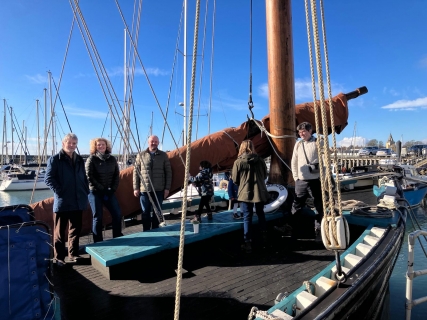Reports
Visit to the Scottish Fisheries Museum
24 March 2024
We spent an excellent, though very cold, day visiting the Scottish Fisheries Museum in Anstruther that tells the story of the Scottish commercial fishing industry from before the Herring Boom in the early 19th Century through to the modern day.
We started off onboard the Fifie sailing herring drifter, the Reaper, which is looked after by volunteer members of the Scottish Fisheries Museum Boats Club. The Reaper is beautifully maintained, but conditions onboard looked very cramped for the crew with some of our group narrowly missed banging their heads below deck, while our smaller members might have fitted into the crew berths rather snuggly!
Our tour of the museum was delayed slightly by an unscheduled visit to the museum café by some before we started what turned out to be an excellent tour lead by another of the museum volunteers, Ronnie Hughs. The Fisheries Museum is definitely much bigger on the inside, with exhibits ranging from fishing gear to dioramas showing a blacksmith’s workshop and the Herring Market, through to boat models and vessels under reconstruction, though the latter are perhaps doomed to remain forever in place unless a very big hole is made to get them out! I could not help but draw an emotive link between the Whaling gallery which was once an important part of the Scottish maritime industry, with the Zulu gallery holding the partially conserved hull of the LK62, a Zulu class fishing boat that had her last fishing trip in 1968.
A number of us finished off our visit with fish and chips overlooking the quayside. It was nice to meet old friends and meet new members of the Society who travelled to Anstruther for the day, especially those who had a longer trip to get there. If you have a suggestion for another branch event this year or would like to get involved as an active local member, please get in touch with us at scotland@rsb.org.uk.
Annual Symposium and Scotland Branch AGM
18 November 2023
We held our annual symposium and Branch AGM at Kelvin Hall, University of Glasgow with members attending in person and online.
This year’s symposium on Marine Biology in Action opened with Esther Brooker from the University of Hull who introduced Scottish Environment LINK and the roles member organisations and communities were playing in marine conservation and advocacy.
Anna McGregor, Alasdair Whyte, and Carolyn McNamara from the University of Glasgow discussed their research investigating the historical ecology of native oysters which involves accessing historical records to identify where oysters were once harvested and identify current sites worth surveying and conservation. The project also involves examining Gaelic language records to better understand the importance of shellfish to local communities and how the value of this harvest has changed over time.
Finally, Niru Dorrian spoke about his career working with the Marine Mammal Observer Association and Institute of Marine Engineering, Science & Technology that link together interests in biology and technology.
The symposium was followed by our AGM and a constitutional change which has updated our committee structure to include three Depute Chairs for Science Policy, Education, and Outreach. This AGM also saw our Chair stepping down after many years’ service to the Royal Society of Biology and the Scotland Branch, and the election of new members of the committee. However, several posts were not filled and the committee would like to encourage anyone with an interest in joining us to get in contact at scotland@rsb.org.uk
We are also committed to supporting members who would like to organise local events, so if you are interested, please get in touch. Our next event will be at the Scottish Fisheries Museum, Saturday 24 February, and the next Annual Symposium and AGM are planned for November 2024 in Dundee.
Dr Andrew Spiers FRSB, Scotland branch Hon. Chair
Biology and brew – A Biology Week event
17 October 2023
It was a dark stormy night, but hidden inside The Wee DRAM! Pub in Glasgow were a gaggle of biologists ready to learn science and drink beer and so it began - the RSB Scotland’s first “Biology and a Beer” event for Biology Week 2023.
Over the evening we had three talks by four speakers starting with Dr Rona Strawbridge, senior lecturer in mental health and wellbeing at the University of Glasgow. Rona introduced the audience to the surprising and increasingly important genetic links between mental health and cardiovascular disease and how the latest genetics research might help identify new therapeutics for both. Next up, Ashleigh Kitchiner, marine mammal specialist, introduced the concept of underwater acoustics and, most importantly, treated us to an audio quiz on human and natural underwater sounds. And last but not least, Dr Charlotte Buckley and Dr Xun Zhang, both researchers in the Vascular Imaging Group, Strathclyde University, teamed up to talk on biological information transfer in blood vessels and how smooth muscle and endothelial cells are able to communicate and the role of mitochondria in regulating signals.
Between these talks there was opportunity for attendees to ask further questions and meet other biologists. Overall the event was a very enjoyable way to spend a dreich evening.
Dr Chas Nelson MRSB
Visit to the Dundee Botanic Garden
22 July 2023
We spent an excellent afternoon at the University of Dundee’s Dundee Botanic Garden with the Curator, Kevin Frediani, who described his vision to ‘re-wild’ both the garden and visitor’s minds.
Botanic gardens can be traced back to medieval (and earlier) healing gardens, and have developed into today’s educational and experiential sites, and the Dundee garden was established in 1971 for both the university and the city. The new re-wilding areas Kevin walked us through are designed to show the importance of interactions between plants and environments and how both might respond to change and damage, as well as embracing new visitors to the garden with different sensory experiences.
The garden is divided into areas with plants from the Americas, Asia, Australia and New Zealand, as well as a native area with Scottish planting and a Garden of Evolution. We were very lucky with the weather and the event was a great way to meet up with old friends and discuss ways the Scotland Branch could organise more local events in the future, weather notwithstanding.
If you have suggestion or would like to get involved as an active local member, please get in touch with the Branch Secretary (scotland@rsb.org.uk).
Dr Andrew Spiers FRSB
Local meeting and talk on the 'Species on the Edge'
22 June 2023
We held a combined meeting with the Chartered Institute of Ecology and Environmental Management (CIEMM) to reach out to local members and provide a relaxing social networking event with an interesting conservation-based talk on the evening of Thursday 22 June, in central Inverness.
Fiona Strachan, Species on the Edge programme manager at NatureScot, gave a very interesting presentation on their new project focussing on the conservation of 37 priority species found along Scotland's coasts and islands. NatureScot are working in partnership with Amphibian and Reptile Conservation, The Bat Conservation Trust, Buglife, Bumblebee Conservation Trust, Butterfly Conservation, Plantlife and RSPB Scotland, and the project has identified seven areas where conservation efforts will provide the best benefits. These areas include the Solway Coast, the Inner Hebrides, Argyll and Lochaber, the Outer Hebrides, North Scotland Coast, Orkney Islands, Shetland Islands, and the East Scotland Coast (See NatureScot's webpage for more details).
What was particularly interesting to see was the project's commitment to engage with local communities, and Fiona described how RSB members might get involved through voluntary work and community events. We also used this meeting to discuss how the RSB and CIEEM could further support local members who perhaps do not have the opportunity to attend in-person events normally organised by the central belt area. Like all good events, and not unexpectedly, many of those who attended the meeting finished the evening off in the local pub!
Our branch committee is committed to supporting members who would like to organise future weekday evening meetings or Saturday events in the Inverness area, so if you are interested, please get in touch with the Branch Secretary at scotland@rsb.org.uk
Our next event will be at the Dundee Botanic Gardens on Saturday 22nd July from 14:00-16:00.
Dr Andrew Spiers FRSB
Biology and the Green Economy Symposium
11 February 2023
The Royal Society of Biology in Scotland held their combined AGM and Symposium in February at the University of Glasgow’s James McCune Smith Learning Hub (originally planned for November 2022). We were quorate, with over 25 members attending in person whilst others listened in to proceedings via Zoom.
We had the chance to talk to some early-arriving members over coffee and tea before the start of events and it was good to meet old friends and new people. The Symposium theme was the ‘Green Economy’, and after a welcome and brief introduction by Prof. Kevin O’Dell (Committee member) to the Learning Hub, we had a series of four talks with Dr. Nicola Vietch (Committee member) in the chair.
Dr John Holland (Scotland's Rural College, SRUC) spoke about the potential for an agroecological approach to farming in Scotland and showed how varied farming methods including organic, low input, regenerative and agroforestry, could all benefit our natural environment and allow sustainable farming. This was followed by Prof. Geoff Squire (James Hutton Institute) who talked about sustainable farming systems and the need to consider processes at the field and landscape levels which would allow us to adapt farming to future climate changes. After this, Prof. Graeme Walker (Abertay University) described a recent student’s use of legumes for the sustainable production of alcoholic beverages and presented several bottles of the World’s first climate positive gin and vodka to the Chair (!).
The final talk was from Dr Duncan Smallman (Seaweed Generation Ltd.) who described their development of a robotic device which can collect Sargassum from the ocean surface and dump it below 150 m where it will fall to the sea floor as a means of carbon sequestration.
Our member’s appreciation of these talks was evident in the questions they asked and their applause. At the AGM, our Chair, Prof. David Coates, described our plans to re-invigorate the committee and engage again with our members across Scotland following the Covid19 disruption. This was followed by reports from the Depute-Chairs, Treasurer, and Secretary, confirmation of Office bearers, and the election of three new members to the committee.
We invite anyone interested in working with us to get in contact through regions@rsb.org.uk
Dr Andrew Spiers FRSB
Symposium on the Biology of Music and Dance
24 October 2020
Snowdrop, a musical cockatoo, moving to the beat; a group of children likewise, each adopting an individual style; audiences’ responses to Indian dance and ballet; symposium members joining a health enhancing song and movement routine. Snapshots of just a few of the many instances that enlivened an exploration into the biological roots of our compulsions to make music and to dance.
Led by four speakers from Scotland and beyond, Professor Tecumseh Fitch (Vienna University and formerly St Andrews) opened with the case for social bonding as an overarching driver for the evolution of music and dance – unifying theories based on adaptations such as mate selection, parental care and group cohesion.
Dr Katie Overy (Edinburgh University) took us into the brain, with an explanation of the structural changes induced by musical experience; followed by insights into music’s therapeutic, educational and social applications.
Dr Corinne Jola (Abertay University), with expertise as both choreographer and neuroscientist, introduced her concept of the embodied neuroscience of dance; an approach that integrates aesthetic judgements and scientific analysis with an overall aim to advance our understanding of how people interact and communicate.
Sophie Boyd (Glasgow University) described her roles as a researcher and the leader of a community singing group for people living with long-term respiratory conditions. Her 'real world' research demonstrates how singing and movement helps manage breathlessness; improvements in health and confidence being enhanced by the enjoyment of a social activity.
Their individual perspectives aside, our speakers emphasised the value of these creative arts in promoting a sense of well-being. A somewhat poignant message, given those precautions leading to our meeting virtually had also curtailed live music and dance for the time being.
Dr Russ Clare MRSB
Biodiversity in Scotland Symposium
12 October 2019
Dr Liz Lakin, FRSB, member of the RSB Scotland branch, gave a warm welcome and chaired RSB Scotland’s Symposium on Biodiversity in Scotland, at the University of Glasgow’s Kelvin Hall Lecture Theatre. The three guest speakers, Professor Nigel Willby (University of Stirling), Charles Dundas (The Woodland Trust) and Toby Wilson (RSPB Scotland) shared their recent work on biodiversity in freshwater, woodland and city environments, respectively.
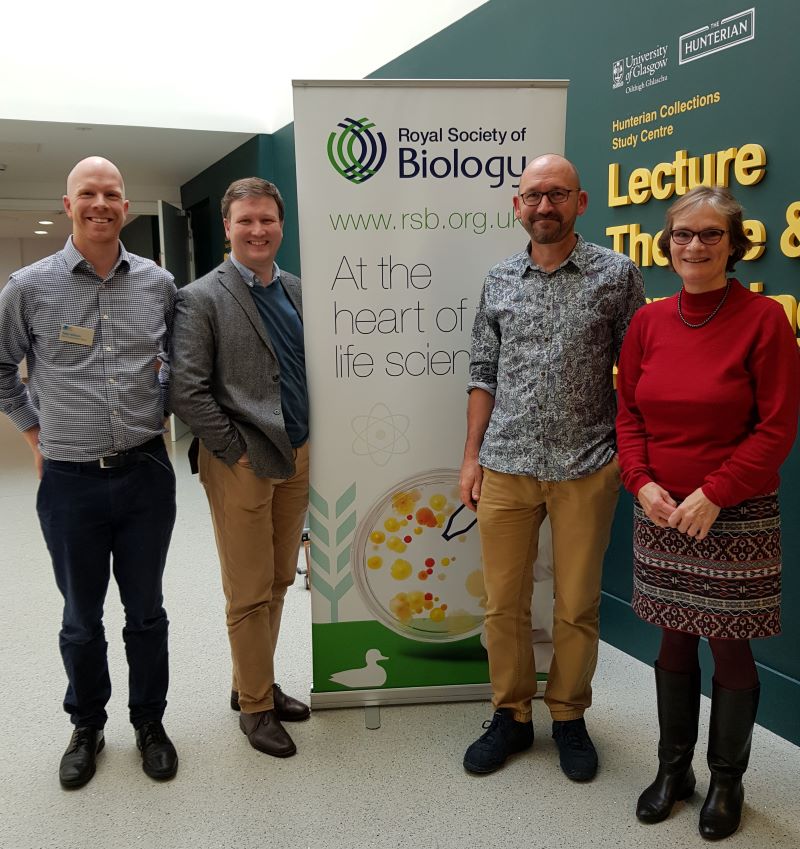
This event was timely, as many attendees to the symposium will have recently received the news that the abundance of species in Scotland is declining a faster rate than elsewhere in the UK.
The speakers placed their findings in a national and global context via The State of Nature 2019 Scotland Report and WWF’s Living Planet Report 2018, presenting attendees with some concerning biodiversity statistics.
However, some good news stories were also shared, with examples such as biologists working alongside land/river managers, policy makers, property developers and the public to improve Scotland’s biodiversity. From beaver dams, to management of coastal temperate rainforest to citizen science informing building developments, these good news stories sparked engaging discussions during the panel Q&A.
Dr Jacqueline Nairn FRSB
Midlothian Science Festival
6-20 October 2018
The MSF is getting bigger and more popular every year.There were over 70 events taking place over two weeks in a variety of venues from local schools, libraries and local businesses such as IKEA. New approaches to delivering science to all ages were trialled, with lots of fun events incorporated.
RSB in Scotland presented activities such as ‘Foodie Futures’, ‘Science Alive’ and ‘Feel Good Science’. Delivering the message of food sustainability, we challenged people to explore the "building blocks of the body" (fats, carbohydrates and proteins) and the content of common foodstuffs with the help of crocheted food (very sustainable!) and informative food wheels.
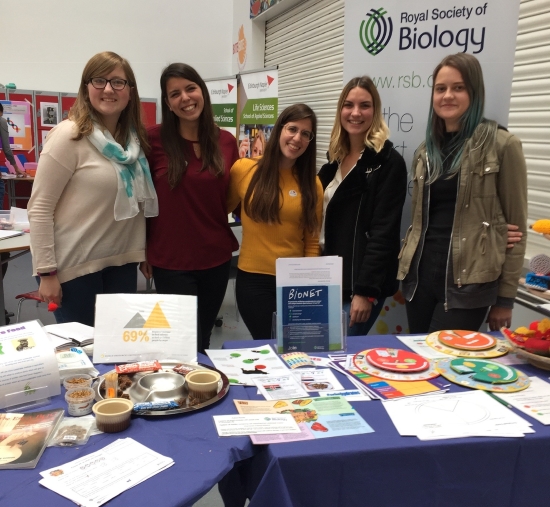
Following on from familiar food the audience were invited to try some edible insects as a future protein source. Lots of great debates ensued including topics such as agriculture, reducing greenhouse gases and growing your own food.
Children (plus many of the volunteers on other stalls!) enjoyed watching coir plugs expand into cosy pots for growing your own vegetable seeds. A rare appearance – the teenage group – arrived before taking part in the 2K ‘colour run’, giving us the opportunity to discuss becoming a biologist. One young man, when asked what kind of scientist would he like to be, replied after much thought "A good one".
Janice Barr MRSB
Genome Editing/CRISPR Symposium, Roslin Institute
13 October 2018
Researchers from across Scotland discussed the biology behind genome editing and CRISPR, its applications in agriculture and some of the ethical considerations arising from possible future applications of this technology.
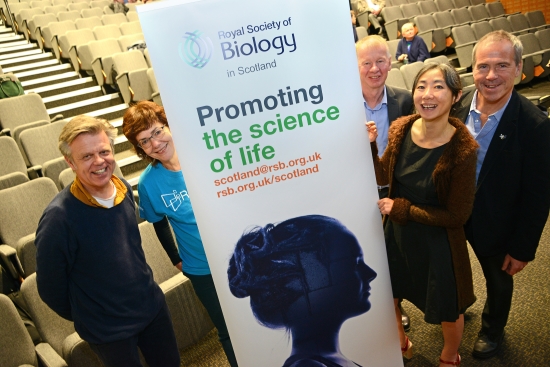
Professor Eleanor Riley, director of the Roslin Institute, welcomed attendees and provided an overview of research at the Roslin Institute. Professor Malcolm White, University of St Andrews, explored the origins, discovery and mechanism of CRISPR systems, and outlined some of the key experiments, publications and researchers involved in the pioneering stages of this technology.
Dr Mark Taylor, James Hutton Institute, outlined current and future uses of genome editing in crops. Professor Helen Sang, Roslin Institute, discussed the successful application of this technology in protecting farm animals from viral infection and outlined the benefits that this approach could bring to a range of farmed animals including chickens, pigs and salmon.
Dr Sarah Chan, University of Edinburgh, considered the ethical issues arising from some of the possible applications of genome editing in plants and animals. This stimulated some interesting discussions at the end of the presentations around current legislation, the pace of change in our ability to apply CRISPR to genome editing, and the pressing need for solutions to problems such as eradicating disease and feeding a growing world population.
The symposium was hosted at the Roslin Institute as part of the Easter Bush Campus Open Day. Following the symposium, attendees met researchers and participated in a range of interactive open day activities.
Dr Jacqueline Nairn FRSB
23rd RSB Scotland Annual Teacher’s Meeting
31 May 2018
This year’s meeting was particularly relevant in that the Scottish Qualifications Authority are changing specifications for qualifications, so speakers and exhibitors were able to offer a range of information and resources to delegates.
Not only did speakers provided updates on knowledge, they gave resources that could be used for planning coursework in Biology at all levels.
The morning session, chaired by Professor Jack Jackson, began with an exciting proposal from Professor Kevin O’Dell that genetics degrees might begin with the sequencing of student’s genomes and they spend the rest of their degree analysing the information.
Dr Liz Patton spoke animatedly about the use of zebrafish in her research on melanoma. Her talk illustrated how even quite humble animals can produce startling insights into gene regulation. Some delegates were heard to announce prospective purchases of zebrafish for their schools.
Dr Anna McGregor spoke passionately on a hot topic regarding plastics in our seas. She gave an interesting twist on this by describing how students could use the types of plastic on beaches to model various species richness instead of using organisms, and also help to clean up beaches in the process!
After lunch, Dr Paul Beaumont and Kate Andrews of SSERC, our fantastic sponsors, outlined very helpful, but also cheap and effective ways of using some materials they have developed for student projects, and generously gave out samples of the materials to delegates.
Last but not least was a fascinating talk from Geoff Morgan, who related how his team have used IT to analyse their pupils’ performance in homeworks and feed back to them. Geoff showed data on how this can make a difference to performance. The fact that his statistical evidence backed up long held anecdotal beliefs was very satisfying!
All in all a great day with very positive feedback for what is the only National CPD event for biology teachers in Scotland this year. The grateful thanks of RSB Scotland go to all speakers and exhibitors.
Alastair MacPherson CBiol MRSB
Loch Leven Nature Reserve
12 May 2018
Vicky Turnbull (Tayside reserves warden) and David Douglas (principal conservation scientist) gave a warm welcome and an introductory overview of RSPB Loch Leven and the work of the RSPB at the nature reserve. On the approach to the wetland area, we glimpsed the wildlife around the loch and on settling into the hides along the south shore of Loch Leven we were delighted by close up sightings of lapwings with their chicks, geese with their goslings, grebes and nesting black headed gulls.
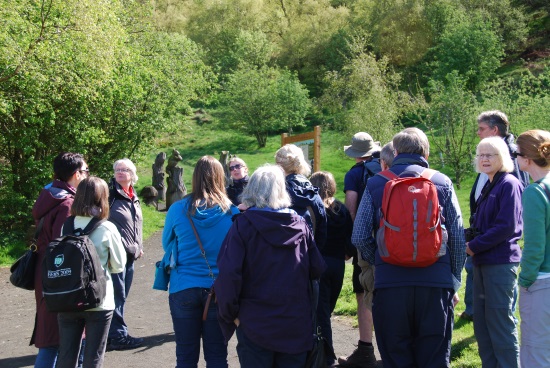
We returned to the visitor centre via the wildflower meadow (worth a late summer return visit) and the Loch Leven Heritage Trail, which provides a 21km car-free trail around the shores of the loch. Quotes from attendees often appear in branch event reports, however, for this event, the calls from the range of birds in the wetland area, along the trails and in the woodland at RSPB Loch Leven provided the most memorable soundbites.
Jacqueline Nairn CBiol FRSB
Science and the Parliament
15 November 2017
The annual Science and the Parliament event, hosted by the Royal Society of Chemistry, brings together members of both the science community and Scottish Parliament in a programme of talks and debating panels. Held at the Dynamic Earth venue in Edinburgh, the focus of this year’s event was “Science, Innovation and the Economy”. Opening speeches by Professor Alan Alexander, Linda Fabiana MSP, Professor Dame Carol Robinson and Dame Jocelyn Bell Burrell highlighted the issues involved. Interdisciplinary networking, the translation of research into successful companies, and women in science were debated throughout the day by panels including MSPs, science and industry policy experts, and CEOs of companies formed directly from university R&D.
The exit of UK from the EU was hotly debated, as was the concern that STEM subjects in Scottish schools have seen a popularity downturn - steps to counteract this are seen as paramount by both the science community in Scotland and the Scottish Parliament. Links between schools and industry, especially in the technology field, are becoming stronger, which may strengthen pupils’ engagement and interest in science subjects. Apprenticeship schemes involving both industry and education providers are increasing thus widening access for many young people interested in a science based career.
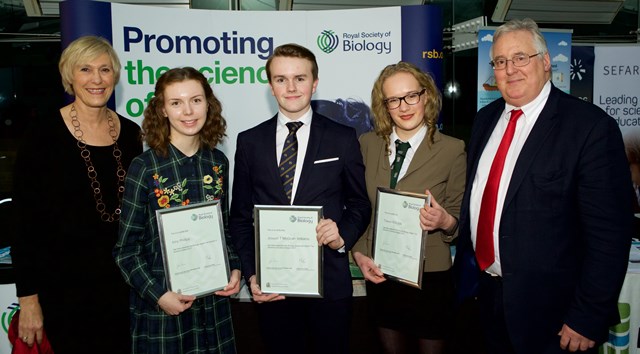 Janice Barr and Stephen Benn from RSB with prizewinners Iona Phillips, Joseph McGrath and Treeve Willcock
Janice Barr and Stephen Benn from RSB with prizewinners Iona Phillips, Joseph McGrath and Treeve Willcock
The annual Royal Societies’ awards for the top performing students was presented by Shirley-Anne Somerville MSP, Minister for Further Education, Higher Education and Science. The RSB in Scotland awarded Treeve Willcock, Iona Phillips and Joseph McGrath Williams prizes for excellence in achieving top marks in recent SQA national examinations in Higher Human Biology, Higher Biology and Advanced Higher. Special congratulations to Treeve for also gaining the top marks in Physics and Chemistry. Rebecca Buick (University of Dundee) was awarded ‘Outreach Champion’ in recognition of her excellent public engagement with science activities.
Janice Barr MRSB
Parasite Diversity Symposium
14 October 2017
At the Exploring Parasite Diversity Symposium at the Roslin Institute, researchers from across Scotland outlined current challenges and possibilities in studying parasites in a range of hosts. Professor Mark Stevens FRSB, from the Roslin Institute, welcomed attendees and provided an overview of research at the institute. Professor James Bron, University of Stirling, described the impact of sea lice on salmon farming, the biology underlying the tenacity of sea lice (complete with 3D images) and possible future treatments.
Professor John Jones, James Hutton Institute, introduced the weird and wonderful biology of plant nematodes, including their suppression of plant host defences and evidence of horizontal gene transfer.
Finally, Dr Liam Morrison from the Roslin Institute offered insights to our understanding of trypanosomes in cattle, and the current interdisciplinary approach to learn more about host-parasite interactions. A number of aspects were common to all three parasite-host systems described: the growing problem of parasite resistance to current treatments, the impact of parasites on food security and the importance of –omic studies to better understand parasite-host interactions.
The Symposium was hosted at the Roslin Institute as part of the Easter Bush Campus Open Day. Following the symposium, attendees met researchers and participated in a range of interactive open day activities.
Dr Jacqueline Nairn FRSB
Lasswade Gala Day
7 October 2017
During Biology Week RSB in Scotland joined the Midlothian Science Festival with a workshop highlighting the science of food and food security.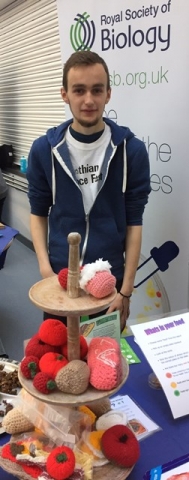 All ages joined in choosing food items and learning about the main food groups making up our current diet. Lively discussions followed about the diet we might eat in 2050, when the population of the world is estimated to be 9 billion.
All ages joined in choosing food items and learning about the main food groups making up our current diet. Lively discussions followed about the diet we might eat in 2050, when the population of the world is estimated to be 9 billion.
Farming insects would be a sustainable option to provide protein for a hungry world with lower carbon emissions. Edible bugs were offered to the audience to test the proposal: toasted mealworms and dried crickets were consumed with some trepidation, while cereal bars made with cricket powder were a more palatable option for many. There is a way to go to change our cultural distaste for eating bugs, though other countries in the world already use insects as an alternative food source.
A ‘grow-your-own’ option to reduce our carbon footprint was explored using coir compost plugs. Children really enjoyed watching them “grow” in water to provide a base for growing simple foods such as tomato seeds, oats, and salad greens. For many this was the first time they had tried to grow plants and they were delighted to take them home.
Many thanks to Dr David Lawson, SRUC, who provided lots of advice and an example of a new research crop of red clover with a high protein content. Thanks also to Gareth West, University of Edinburgh, for helping on the stand.
Janice Barr MRSB
Making Life Science Happen – Biology Careers
22 September 2017
Members from across Scotland met at the STEM Hub based on the University of the Highlands and Islands campus, where the Scotland branch hosted a workshop designed to communicate and strengthen the understanding of biology-based career opportunities in Scotland.
Our aspiration was to listen and support teachers, careers advisors and students by identifying the types of 'toolkits' that would help them advise school children in making informed decisions about their careers.
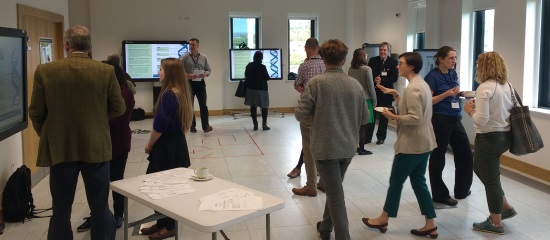
The Highlands and Islands Enterprise opened the event with a showcase of life science companies in the Highlands and Islands, which took us from the virtues of kelp to robotics. With over 70 life science organisations employing around 1,800 people ranging from marine bioprocessing to healthcare, there is certainly a diversity of opportunities.
Our members, from Shetland to Edinburgh, took us on a tour of career opportunities using interactive posters which generated lots of discussion and networking. Our members' careers ranged from communicating science; policy development; educating and training the next generation, to research and development of innovative products and regulatory compliance.
Alison Frew from Scottish Enterprise explained how starting as a research biologist can lead to a dynamic career in quality assurance and business development. Finally, Ronnie Palin from Skills Development Scotland shared the work they are doing on identifying the skills required by organisations to enable the delivery of Scotland's Life Science Strategy.
The workshop was concluded with a short survey which will inform how we expand this type of workshop along with a lively discussion on how to inspire the next generation of biologists and provide information that is fit for purpose.
Dr Nicola Marchant FRSB
"Senses and the Brain" at Midlothian Science Festival
18 June 2017
This year Midlothian Science Festival trialled a new public engagement approach by running science based activities alongside a football competition. The Lothian Veteran Centre Football Tournament, Dalkeith, involved teams from all age groups from children to adults, with families cheering on the teams and fairground stalls.
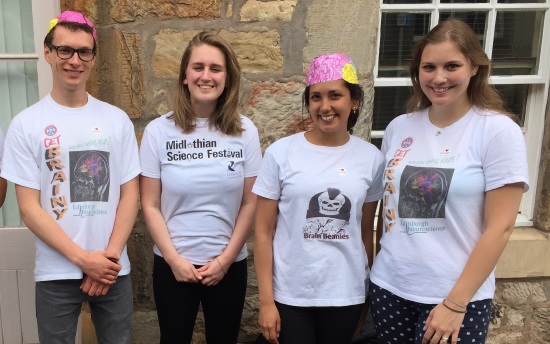
L-R: Our volunteers Matt, Sandy, Caitlin and Michelle. Matt and Michelle are sporting their well made brain hats.
The 'Science Tent' was visited by 228 people during the course of the day which is encouraging considering the tent was surrounded by 'all the fun of the fair'! Our RSB in Scotland stand "Senses and the Brain" (in collaboration with Jane Haley, Edinburgh Neuroscience, aimed to demonstrate how our senses gather information from the environment to inform the brain.
These included Braille books, colouring in hats, brain models, and brain beanies (beanbags in the shape and real weight of the brain). After cracking the code of Braille, children aged 7 and above proved to be faster than the adults at working out specially printed Braille word cards.
As the brain beanies include animal brains, lively discussions arose about how family pets brains are adapted to particular senses e.g. the olfactory bulb in dogs.
Many thanks to neuroscience students, Michelle Rivera Sanchez, Sandy MacMillan, Matt Colligan and Caitlin Stuart-Delavaine who gave up their Sunday to help with the stand.
Janice Barr MRSB
22nd RSB Annual Teacher's Meeting
1 June 2017
Delegates from across Scotland attended the 22nd conference in Edinburgh. This year's theme was aimed at extending knowledge of subject areas in the Curriculum for Excellence (CfE) Biology courses, from the Broad General Education(BGE) to Advanced Higher.
The first presentation, by Professor Wendy Bickmore, addressed an area of biology under intense investigation. She revealed how much more is now known about "dark" areas of the genome and how sequences therein are related to medical conditions. Particularly interesting was her references to how these non-coding regions are involved in evolution.
Dr Martin Hughes then took us through a number of engaging uses of ordinary materials for teaching ecology in the BGE, and related how waxworms may be used to biodegrade plastic, amongst a number of other fascinating topics.
Marjorie Smith of Scottish Schools Education Research (SSERC), the sponsor of the event, gave a highly personal account of her multiple myeloma, bravely describing her experiences through diagnosis, chemotherapy and fortunately recovery. Her account, which is relevant to areas of the Higher Biology and Human Biology specifications, was very well received by the audience.
After lunch, Kate Andrews of SSERC led a hands-on activity for delegates investigating immobilisation techniques that students could use in classroom investigations. SSERC also provided packs of materials for delegates that were gratefully received.
Finally, Jack Jackson, the organiser of the event over the last 22 years, gave attendees an account of the development of the CfE and his perspective on its benefits and shortcomings. This generated much lively discussion and rounded off an excellent event.
Feedback from attendees showed that this event remains very important in teacher's CPD and comments from delegates remain overwhelmingly positive.
Thanks should go to organisers Intelligent Events, and to the exhibitors whose wares attracted much attention in the breaks for coffee and lunch.
Dr Alastair MacPherson CBiol MRSB
STEM Education and Training Scotland Workshop
6 January 2017
Scotland has distinct education arrangements and the Scottish Government recently launched a consultation on STEM Education and Training. To ensure that members in Scotland have a coordinated response on devolved topics such as Education, the Society’s Council endorsed the formation of a Scotland based Policy and Education Group; a subset of the RSB Scotland branch; addressing the issues affecting the life science community here.
A primary focus of the group will be creating a supportive environment through the development of position statements and evidence based input into Scottish education. The group will be working in close partnership with RSB headquarters, Royal Society of Edinburgh, Skills Development Scotland (SDS), and Scottish Enterprise (SE).
The Policy and Education Group hosted an inaugural workshop in partnership with SDS and the SE to gather the views of the Scottish bioscience community on the draft STEM education and training strategy. The event was well attended with representatives from schools, universities, colleges industry, Government, and students, all contributing to a lively discussion. In addition, a written response was also received from parents facilitated by the National Parent Forum Scotland.
The Royal Society of Biology submitted a response to the consultation using the outcome of the workshop. In addition, the outcome of the workshop also informed part of the Learned Societies Group submission to the strategy.
If any members are keen to engage with the Policy and Education group, please email Nicola Marchant at scotland@rsb.org.uk
Nicola Marchant FRSB
Science and the Parliament
9 October 2016
The annual Science and the Parliament event, hosted by Royal Society of Chemistry, took place in Edinburgh’s Our Dynamic Earth exhibition.
The day brings together politicians from the nearby Scottish Parliament and the scientific community to discuss topical scientific issues. This year’s theme focussed on science education in Scotland, timed to coincide with the recent independent report on education by STEMEC and with a consultative document prepared by the Scottish Government.
The format of the conference aimed to promote active debate, with open discussion panels of politicians from all parties (chaired by BBC science correspondent Ken McDonald) and breakout sessions led by experts in the field.
To start the day, Professor Sir John Holman and Ken McIntosh, the Scottish presiding officer, outlined Scotland’s strong history of scientific achievement. The chief scientific officer, Professor Sheila Rowan, highlighted the need to find novel ways in science communication to inspire future generations. Jim Swinney, MSP, Deputy First Minister, welcomed the STEMEC report and encouraged open debate on the strategy outlined in the consultative document.
The breakout sessions discussed topics including primary science, the resourcing of science and the role of local authorities. Dr Elizabeth Lakin FRSB led the breakout session on national testing.
Shirley-Anne Sommerville, Minister for Further Education, Higher Education and Science, presented prizes from RSC, RSB Scotland and the Institute of Physics to the top students in Scotland. This year RSB Scotland awarded prizes to three students obtaining the top marks in this year’s SQA examinations. An award in recognition of academic excellence and outreach engagement was also presented to the top student in Scotland.
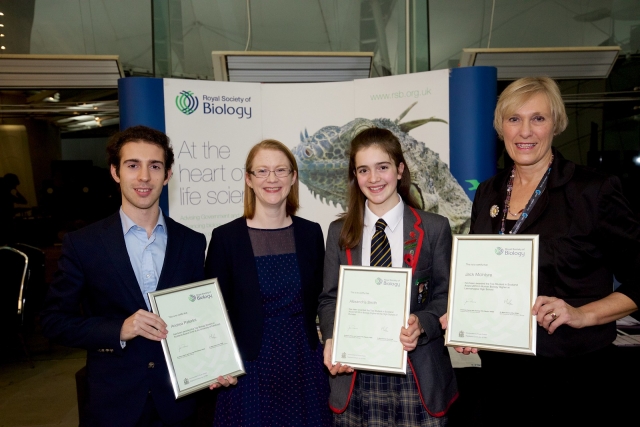
Janice Barr MRSB
Visit to the Great Trossachs Forest
14 May 2016
“I can imagine how it will look, but I'll want to see it when I'm 90,” declared Sue Morris, manager of The Great Trossachs Forest Project as she directed our gaze to new broad-leaved tree plantings.
We were at the Inversnaid RSPB reserve near Loch Lomond, where spectacular scenery, perfect weather and our excellent guide were proving a winning combination for the branch's annual spring outing.
Sue's jocular birthday wish along with a minibus drive of over 20 miles from the Woodland Trust Scotland base at Glen Finglas hinted at the epic scale of the project: the creation and management of a mosaic of species-rich, natural forest habitats across some 16,650 hectares of The Loch Lomond and The Trossachs National Park, to be developed and managed for 200 years.
Our journey had passed by the Loch Katrine catchment maintained by Forestry Commission Scotland, the third party in this work started in 2009. As members of the BP-sponsored Scottish Forest Alliance established in 2000, the three neighbouring partners had recognised how a co-operative project could realise greater ambitions.
A grand tour presented evidence aplenty of progress towards that vision, including clear felling of non-native trees, tree planting, natural regeneration, management of grazing deer and feral goats, and the mutual benefits of farm-forestry partnerships, notably employing cattle as bovine ploughs to prepare ground for tree planting.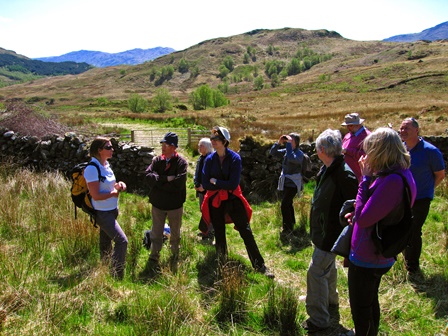
On a glorious day many visitors were making the most of a growing network of cycling and walking paths, visitor centres and nature trails, along with historical trails following the area's rich cultural heritage, from the art of the Glasgow Boys to the writing of Sir Walter Scott.
Recently designated the UK's latest, and certainly largest, National Nature Reserve, The Great Trossachs Forest offers biologists many rewards, and a visit is highly recommended.
Russ Clare MRSB
Biology, Ethics and Communication
14 November 2015
Branch AGM at The Byre Theatre in scenic St Andrews. This year's theme was communication in science.
Professor Bruce Whitelaw FRSB from the Roslin Institute combined ethical arguments for/against genome manipulation and science communications, very effectively. Bruce contrasted the older transgenic technology with the precise genome editing (GE) methods, only developed recently. So this was really cutting edge, illustrating how rapidly advances are being discussed in public and taught at schools. Bruce described his work using GE to create pigs resistant to African swine fever and talked about the highly publicised case at Great Ormand Street where a child was cured of leukaemia using GE.
Next Dr Lisa DeBruine from University of Glasgow and the Young Academy of Scotland gave lots of advice to scientists planning to communicate through the media. Lisa described how direct contact through science centres and exhibitions can be very rewarding but hard work and costly; funding is available through the RSB. Then of course there is social media: twitter or your own blog. Lisa mentioned The Conversation blog made of academics - join! Then there your press office, it is very important to get the press release right, to avoid being misquoted.
Finally, Dr Nicola Marchant FRSB (member of RSB Scottish branch council) talked about ethics in business. Nicola was a former chair of the bioethics advisory group at AstraZeneca. The key phrase "It's necessary for companies to do the right thing" was used by Nicola but what does this mean? Businesses needs to make money, to be sustainable and to balance this with ethical practices. Nicola showed the stats speak for themselves: companies which practice ethical management do the best. So it pays.
Recently companies have been reported to withhold negative data on drug trials. This is an example of poor communication, more than 78% of clinical trials are published. But in the end it is clear "business needs to do the right thing", remember what happened to Volkswagen recently? They tried to cheat on environmental controls and the company lost billions.
So effective communication helps!
Professor David W Burt FRSB and Dr Liz Lakin FRSB
Science and the Parliament Event
11 November 2015
The 16th Science and the Parliament event organised by the Royal Society of Chemistry (RSC) on behalf of the scientific and engineering community in Scotland, took place at Our Dynamic Earth. This annual event aims to promote engagement between members of the scientific community, MSPs and other policy makers in the Scottish Parliament and Government.
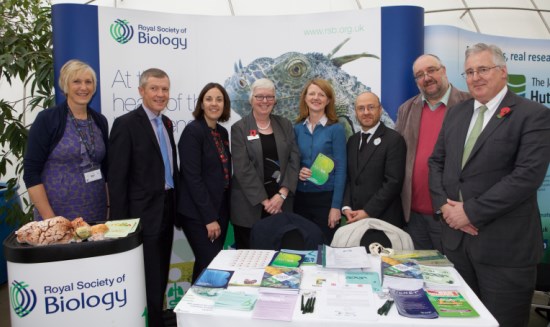
Janice Barr MRSB, Willie Rennie MSP (leader Scottish Liberal Democrats), Kezia Dugdale MSP (leader Scottish Labour Party), Dr Jane Magill RSB regional coordinator, Dr Jacqueline Nairn FRSB, Patrick Harvie MSP (leader Scottish Green Party), Professor David Coates FRSB and Dr Stephen Benn RSB director of parliamentary affairs
The Scottish General Election themed event started with a warm welcome from Professor Alan Alexander, general secretary of The Royal Society of Edinburgh, and Professor Dominic Tildesley, President of the Royal Society of Chemistry. Professor Neva Haites set out the outstanding achievements of the Royal Society of Edinburgh (RSE) and how the RSE strives to enable evidence based science to inform politicians and to shape policy.
Rhiannon Cleghorn and Rebecca Brown from Lossiemouth High described their recent trip to Botswana. Both pupils delivered lessons to 10-17 year olds on the subject of hydrogels, using a learning resource supplied by the RSC. Rhiannon and Rebecca described how they met the challenges of running hands on science sessions with limited infrastructure. Their enthusiasm for their subject was tangible.
In a series of presentations and discussions, a range of MSPs set out their vision for the future of science and engineering in Scotland. Contributors included Dr Alasdair Allan MSP (Minister for Learning, Science and Scotland's Languages), Kezia Dugdale MSP (leader Scottish Labour Party), Liz Smith MSP (Scottish Conservative Party), Willie Rennie MSP (leader Scottish Liberal Democrats) and Patrick Harvey MSP (leader Scottish Green Party).
In recognition of excellent academic performance, the RSB Scotland branch awarded prizes to the top performing students in higher biology, higher human biology, higher biotechnology and advanced higher biology for 2015. The Top Biology Student in Scotland also received an award in recognition of academic excellence and engaging the wider public in biology.
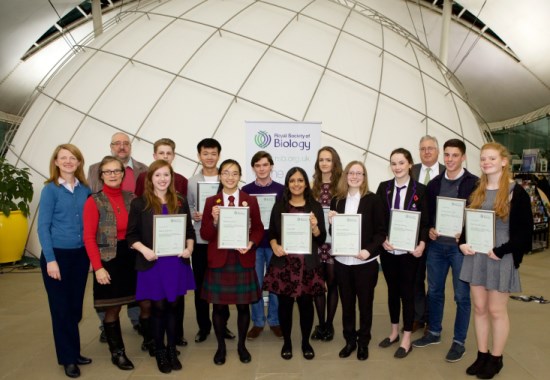
Details of the awards for 2015 are:
Biology Higher: Jack L Bauchop, St Modan's High School
Biology Advanced Higher: Elaine Duncan, Hutchesons' Grammar School
Biology Advanced Higher: Rachel E McLeod, Balerno Community High School
Biology Advanced Higher: Karen T Hase, Ellon Academy
Biology New Higher: Gregor N Duncan, Cults Academy
Biology (Revised) Higher: Rebecca Poon, George Watson's College
Biology (Revised) Advanced Higher: Sophie B Nash, Stirling High School
Biology (Revised) Advanced Higher: Zenab Ali, James Gillespie's High School
Biology (Revised) Advanced Higher: Brandon C F Shek, James Gillespie's High School
Human Biology Higher: Baran Karakus, St Thomas Aquinas Secondary School
Human Biology New Higher: Gordon McNicol, Paisley Grammar School
Human Biology (Revised) Higher: Rachel A Imray, Culloden Academy
Biotechnology Higher: Emma Ewen, Perth College
Top Student in Scotland: Ines Alvarez Rodrigo, University of Edinburgh
Jacqueline Nairn FRSB
A Biology Week event in Scotland funded by the Regional Grant Scheme
"What's inside your head?" at Midlothian Science Festival
10 and 17 October 2015
Funded by a RSB regional grant, our newly designed cloth-kit family of 'brain beanies' was debuted at the Midlothian Science Festival. The annual, two week festival provides a wide range of science activities to a diverse audience of all ages and backgrounds.
Our activities aim to demonstrate brain weight and size using the beanbag 'brains'. Our first venue was the festival's gala day at the Lasswade Centre, hosting many activities and attracting an attendance of over 400. Small children enjoyed the challenge of picking up the adult brain (1.4kg) with both hands and trying to put it on their heads. Lots of conversations ensued about the brain and children enjoyed colouring-in and making brain hats, which outlined the main areas of the cortex.

Animal brain beanies became beloved pets ("our dog must have a bigger brain than that!") and the relationship between the brain and behaviour was discussed. Many were surprises about the small size of dinosaurs' brains.
Mayfield Library, a smaller venue, attracted over a hundred people. Many children spent a longer time here, chatting whilst colouring in. This led to the waiting adults asking more in-depth questions about the brain, with everyone enjoying handling the beanies.
At both events we were supported by volunteers from Edinburgh University, neuroscience PhD students Sze Ying, Konstanze Simbringer and Ana Maria Rondelli, to whom we give our thanks.
Janice Barr MRSB (Scotland branch committee member) and Dr Jane Haley (Edinburgh Neuroscience)
20th Annual Teacher's Meeting
28 May 2015
Over one hundred delegates from across Scotland attended our 20th teachers' conference at the Royal College of Surgeons, Edinburgh. The theme for this year was aimed at the new "Curriculum for Excellence" Biology courses, specifically for the new Higher Biology qualification.
The originator of the event, Professor Jack Jackson, chaired the proceedings with his usual aplomb reminding us that biology teachers were the innovators and researchers of the future. The first two lectures addressed two areas of biology that have not formed a large part of previous courses, namely parasitism and food security, delivered by Professor Elisabeth Innes and Professor Rachel Norman respectively. Both were well received and gave the audience a fascinating insight into these two important areas. Next, Geoff Morgan, one of the development team for the new Higher, described the various processes and decisions that were made in framing the course, outlining how the systems approach could be used to get the best out of it.
After a lunch in one of the many fine rooms in Surgeon's Hall, Kate Andrews of the Scottish Schools Education Research Centre (SSERC) led a hands-on activity for delegates on an approach that can be used to help students investigate perception. SSERC also provided a pack of materials for each school present that was very well received.
Feedback from attendees showed that this event remains very important in teachers' CPD calendar and comments from delegates were overwhelmingly positive. Thanks should also go to the organisers, Intelligent Events, and to the exhibitors whose wares for the CfE courses attracted much attention in the breaks for coffee and lunch.
Dr Alastair MacPherson CBiol MRSB
The Scottish Centre for Ecology and the Natural Environment (SCENE)
16 May 2015
Members and guests gathered at SCENE's Loch Lomondside base on a bright and blustery day. The rich natural beauty of the site, set in secluded woodland on the west shore beneath high hills, soon drew many admiring comments.
The Centre was established by the University of Glasgow in 1946 in a collection of ex-army huts, in a pioneering move towards field-based environmental study in Britain. It has evolved from such humble origins to encompass multi-disciplinary research in ecology, evolutionary biology, physiology and disease ecology alongside a continued commitment to teaching, as its director Colin Adams described in a fascinating history. Recently rebuilt to exacting environmental standards through a mix of grant-aid and private donations, the Centre has gathered many 'green building' awards.
Further presentations on speciation in fish and behavioural ecology in birds and fish, from Colin, Barbara Helm and Neil Metcalfe, promoted wide discussion of both the details of research and wider issues, notably the distinction and balance between fundamental and applied work. Among many insights gathered from a tour of the facilities, the devious methods for attracting and collecting mosquitoes and biting midges prompted knowing comments given the latter's local notoriety.
The day concluded with Barbara's guided woodland walk above the loch to examine nest boxes. Earlier, we had learnt how remote measurement of blood flow using thermal imaging can be used to monitor stress in birds. While such high-tech research progresses, the walk demonstrated that value is still placed on data collection reliant on the naturalist's traditional skills with eyes, ears and a simple step ladder.
Grateful thanks are due to our hosts, together with their enthusiastic post-doctoral colleagues and graduate students, for their generosity in providing such a rewarding visit.
Dr Russ Clare MRSB
Feeding the Future: Can we do it sustainably?
9 February 2015
Professor Tim Benton FSB, UK Champion for Global Food Security and professor of population ecology at the University of Leeds, gave the 12th Peter Wilson Lecture "Feeding the Future" at a packed Royal Society of Edinburgh.
Tim started the proceedings by outlining the many drivers that affect food security, including population growth, increased prosperity, the desire to eat more protein (usually meat), and more people living in cities. There is also climate change, which is going to reduce our capacity to grow food in many parts of the world.
All these factors will lead to more competition and instability on the world. The market always claims, if there is a demand, it will always be satisfied – but can it? Tim asked the big question whether we can do this sustainably by at first asking what "sustainable" means.
One useful definition by Brundtland is "development that meets the needs of the present without compromising the ability of future generations to meet their own needs". There are many possible solutions, some simple and others requiring the development of novel technologies: increased production through better management and land use, and the use of novel technologies (e.g. genetic improvement of crops and livestock).
But there is also the reduction of waste, which is so prevalent in the developing world. In the developed and affluent world we also eat too much, and so another useful quote, this time by Tim Lang: "The rich have to consume less and differently so that the poor consume more and differently". The lecture was followed by a lively Q & A session, included discussion around the implications for animal welfare (should we abandon welfare issues? Everyone said no), market forces and many others.
Finally, Stuart Monro of the Scottish Consortium for Rural Research gave the votes of thanks for what was a very successful lecture with everyone looking forward to the 13th Peter Wilson Lecture next year.
Professor David W Burt FSB and Dr Liz Lakin FSB
AGM and Symposium on Big Data and Precision Medicine
15 November 2014
Each year the Scotland branch organises a public event to highlight a rapidly developing area of the life sciences. This year's topic was 'Big Data and Precision Medicine'. Organised and chaired by John Coggins, more than 50 people attended the Science Show Theatre at the Glasgow Science Centre.
Recent advances in human genetics, coupled with the availability of very detailed information for individual patients is leading to major changes in healthcare. In future the focus will be about getting the right treatment, to the right patient, at the right time, through stratified or precision medicine. This involves examining the genetic makeup of patients and their differing responses to the drugs designed to treat specific diseases.
Four speakers gave presentations on this exciting and rapidly developing area:
- Anna Dominiczak (Regius professor of medicine and vice principal and head of the College of Medical, Veterinary and Life Sciences at the University of Glasgow) 'Stratified Medicine Scotland Innovation Centre - the right treatment, to the right patient, at the right cost'
- Jill Pell (professor of public health and director of the Institute of Health and Wellbeing at the University of Glasgow) 'Using Big Data for Health Research'
- David Sibbald (founder and CEO of Aridhia Informatics) 'Future developments in personalised medicine and the role of the commercial sector'
- Sean Grimmond (professor of medical genomics at the Wolfson Wohl Cancer Research Centre, University of Glasgow) 'Mapping what drives cancer and taking the guesswork out of chemotherapy'
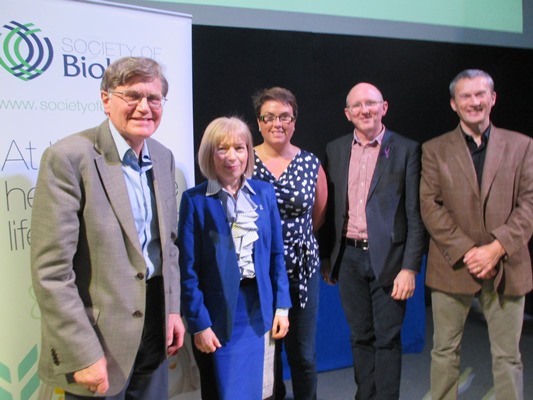 In a visionary presentation Professor Dominiczak introduced the topic of stratified/precision medicine and explained how the Stratified Medicine Scotland Innovation Centre at the new South Glasgow University Hospital Campus is providing Scotland with the opportunity to be a world leader in this field.
In a visionary presentation Professor Dominiczak introduced the topic of stratified/precision medicine and explained how the Stratified Medicine Scotland Innovation Centre at the new South Glasgow University Hospital Campus is providing Scotland with the opportunity to be a world leader in this field.
Professor Pell described the data that are routinely recorded by the health sector and other sectors. With fascinating examples she demonstrated how these data, when they are linked, can be invaluable in understanding the factors that impact on health and what can be done to improve it. She also explained how vital it is to protect patient anonymity and build public confidence in the use of such data.
Dr Sibbald argued that, if we are not to be overwhelmed by the escalating costs of health care, particularly in the face of ageing populations, we need to rethink how medical care is delivered and to decrease the time delays in introducing new therapies. There was much to learn from the commercial sector on how to benefit from the vast amounts of data now available. This will require a major cultural change to facilitate the sharing of data between the public and private sectors and a significant shift to spending on better, faster, more sensitive diagnostic tests and especially on preventative medicine.
Professor Grimmond used the analogy of DNA as the cell's computer hard drive to illustrate the complexity of cancer. He emphasised how our understanding of the molecular basis of cancer has dramatically improved and how rapid sequencing techniques have made it affordable to use genomics to map out what drives each cancer type. Through massive international collaborations cancer atlases are becoming available which are allowing oncologists to find the Achilles' heel in cancers, one patient at a time. Cancer is not just one disease. Lung cancer, for example, could be hundreds of distinct cancers, each defined by specific molecular characteristics requiring different treatment approaches. This makes research and treatment more challenging but the payoff for patients will be enormous. Treatment is determined by key molecular 'hubs' that must be targeted within cells and is only administered to patients whose tumours have these 'hubs'.
The Symposium agenda and speakers' slides are available:
Agenda
Slides for Professor Anna Dominiczak
Slides for Professor Jill Pell
Slides for Dr David Sibbald
Slides for Professor Sean Grimmond
Professor John Coggins FSB
Science and the Parliament, Our Dynamic Earth, Edinburgh
12 November 2014
For the past several years, the science and the parliament event has been organised by The Royal Society of Chemistry on behalf of the scientific and engineering community in Scotland. This event is aimed at promoting engagement between members of the scientific community, MSPs and other policy makers in the Scottish Parliament and Government. The 2014 event focussed on the contribution of science and engineering to 'Science Education in Scotland'.
A warm welcome was extended by Bristow Muldoon (Scottish parliamentary liaison officer for the Royal Society of Chemistry and head of policy advice for the Royal Society of Edinburgh) and Professor Lesley Yellowlees (past president, Royal Society of Chemistry) at the outset of the meeting. This was followed by an excellent, thought provoking presentation by Professor Dame Jocelyn Bell Burnell (president, Royal Society of Edinburgh) on 'Why Girls Don't Choose Physics'. Later discussions explored 'Science in Schools' and the interface between science in schools/universities and industry.
In recognition of excellent academic performance, the Society of Biology awarded prizes to the top performing students in higher biology, higher human biology, higher biotechnology and advanced higher biology for 2014. The top biology student in Scotland also received an award in recognition of both academic excellence and engaging the wider public in biology.
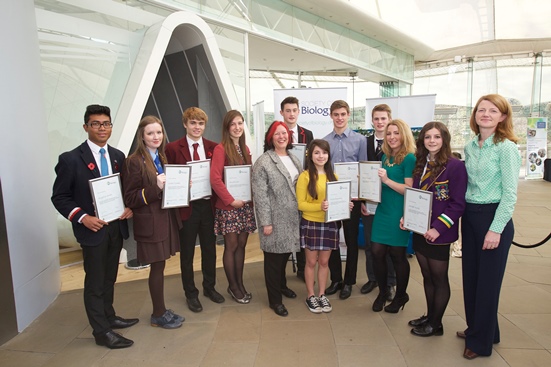 Details of the awards for 2014 are:
Details of the awards for 2014 are:
Award Recipient
Top biology student in Scotland: Kirsty Hooper, Edinburgh Napier University
Biology higher: Thomas Parker, Largs Academy
Biology (revised) higher: Matthew J Henderson, George Watson's College
Biology advanced higher: Alice Burnett, High School of Dundee
Biology (revised) advanced higher: Alexander H Gough, James Gillespie's High School
Biotechnology higher: Kyrie P Grasekamp, Dollar Academy
Human biology (revised) higher: Jennifer M Young, Marr College
Human biology higher: Benjamin Plant, St Ambrose High School
Human biology higher: Lauren Crossley, Notre Dame High School
Human biology higher: Kingshuk Ghosh, Aberdeen Grammar School
Jacqueline Nairn CBiol MSB
Visit to Tentsmuir National Nature Reserve
31 May 2014
On a glorious cloudless Saturday morning at the end of May, Tom Cunningham, reserve manager at Tentsmuir National Nature Reserve, led a guided tour around Tentsmuir Point. Tom escorted the group through Tentsmuir Forest, over the dunes covered with sand-binding grasses and out onto expanse of Tentsmuir Sands.
The dynamic nature of the reserve was brought to life by Tom’s descriptions of the history of the site, the management of the reserve, and the impact of River Tay currents and North Sea tides. In addition, the vivid memories of member Fiona Maisels revealed the extent of recent changes on this shape-shifting landscape.
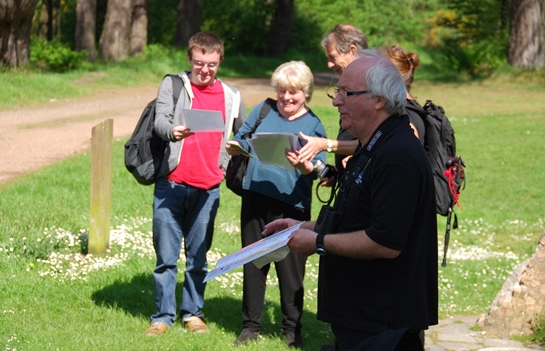 Scotland branch would like to extend a special thank you to Tom Cunningham for sharing his love of this site, and for arranging the start of summer!
Scotland branch would like to extend a special thank you to Tom Cunningham for sharing his love of this site, and for arranging the start of summer!
Dr Jacqueline Nairn CBiol MSB
19th Society of Biology Scotland Annual Teachers' Conference: Taking Biology Forward
29 May 2014
Every year we hold a conference with teachers and researchers to share news, make new friends, and with over 100 participants this was not a problem.
Lorna Marson a transplant surgeon from Edinburgh University started with a lecture on the practical, ethical and moral issues raised by organ donation matched by lively debate with the audience. During the conference there was some discussion on the need for statistics in the biology curriculum.
Catriona Harris an ecologist from St Andrews University illustrated this very clearly in the task of counting marine mammals which requires sophisticated mathematical models to account for the uncertainty in our observations. Download presentation
Kate Andrews from SSERC worked with the audience to show a new practical on the role of nutrients in plant growth. What impressed me was a quote from a pupil after an exam "I could see the experiment in my head when I was writing the answer". Clearly showing why we need practicals in the biology curriculum. Download presentation
Clare Halpin from Dundee University covered the controversial "Food versus Fuel" debate. Clare talked about using alternative crops, and the balance between the application of modern genetics and genetic manipulation of crops.
Pat Monaghan from Glasgow University talked about interdisciplinary approaches to study lifespan. Trying to predict lifespan is difficult "... baldness, grey hair and wrinkles are not predictive of lifespan but the length of our telomeres are." Of most concern to me was the news that stress shortens your lifespan and this stress effect can be passed on by your partner!
Scott Bryce from SSERC concluded the day with examples of IDL or Interdisciplinary Learning, where problems in experimental biology need approaches from all the sciences, maths and even art. For me, this is how I have worked all my life "I consider myself as a scientist with a passion for biological problems and not simply a biologist".
Professor David W Burt FSB
Great Ideas of Biology
24 February 2014
Every year we unite with the Royal Society of Edinburgh and the Scottish Consortium on Rural Research to invite a distinguished lecturer to address a biological topic of great public interest.
This year Dr Alan Belward, head of land resource management at the European Commission's Institute for Environment and Sustainability, Ispra, Italy spoke on: Running out of land – a new global challenge.
Land is not often considered a non-renewable resource, but it should be. The land meets most food, fuel and fibre needs of our rapidly growing human population and shapes Earth's climate too - competition for this finite resource is fierce. Satellites provide a unique vantage point from which to determine how, when and where the use of land resources is changing.
Alan Belward's brilliantly illustrated talk introduced some of the policies that impact global land-use and highlighted the very important role that Earth-imaging satellites play in the continual and accurate monitoring of land use. You can hear his lecture in full on the Royal Society of Edinburgh website.
Professor John Coggins FSB
Annual Symposium and AGM
16 November 2013
Mindful of ambitious renewable energy targets, our annual symposium focused on biologists' role in such technologies.
While first generation biofuels (e.g diesel from plant oils, ethanol from sugar crops) compete with food production for land, cellulose in plant waste as a potential fuel resource does not. Enzymic breakdown of cellulose yields sugars for fermentation.
Professor Claire Halpin of Dundee University explained, in practice the efficiency of the process is restricted by lignin, the waterproofing and strengthening component of cell walls. Her research on barley employs genetic technologies to identify genes controlling lignin biosynthesis in a first step towards possible development of new varieties with lignin content modified in favour of biofuel.
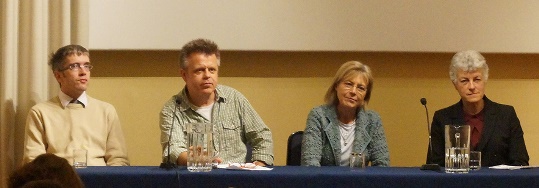 From left to right: Dr James Pearce-Higgens, Dr Kevin O'Dell (Scotland branch and panel chair), Professor Claire Halpin, Dr Jennifer Norris.
From left to right: Dr James Pearce-Higgens, Dr Kevin O'Dell (Scotland branch and panel chair), Professor Claire Halpin, Dr Jennifer Norris.
Aggressive tidal flows in Orkney waters have placed the Islands at the forefront of marine energy development, the European Marine Energy Centre being the world's first and only grid connected testing site.
EMEC research director, Dr Jennifer Norris, addressed concerns over the technology's ecological impact. Are installations' moving parts hazardous to marine mammals and diving birds? Does noise and physical intrusion cause species displacement? Evidence is elusive as data collection from remote and hostile undersea locations is difficult, but EMEC's integrated approach following multiple and innovative data sources should provide answers.
Finally, Dr James Pearce-Higgens, principal ecologist with the British Trust for Ornithology asked, 'should we get in a spin about wind farms and birds?' In the UK, where sensitive habitats and favoured sites for wind farms tend not to overlap, evidence does not support serious concern over collision mortality. Nevertheless, James' study of upland birds at wind farms shows reduced numbers from disturbance at construction sites and in-place turbines, with curlew and snipe particularly vulnerable. Clearly, a planning consideration for any wind farm proposals in bird sensitive areas.
Dr Russ Clare CBiol MSB
Science and the Parliament
13 November 2013
For the past several years, a 'Science and the Parliament' event has been organised by The Royal Society of Chemistry on behalf of the scientific and engineering community in Scotland. This year's theme was Science in Health.
All scientific disciplines clearly have an essential role to play in tackling global healthcare challenges, but the work of policy-makers is equally important. A presentation, therefore, by the Cabinet Secretary for Health & Wellbeing was particularly interesting and relevant.
The scientific programme included excellent presentations relating to systems medicine, large-scale food poisoning outbreaks, water quality, advances in human genome mapping, veterinary vaccine development, advanced medical imaging related to cardiovascular disease and social and behavioural dimensions of sexual health.
Scotland has emerged as a globally-leading nation for health researchers wishing to exploit a particularly well-advanced system of data recording and accessibility.
Representatives of four political parties in the Scottish Parliament delivered presentations and inevitably questions were focused on the practical implications for the future of science funding in an independent Scotland.
The day concluded with prizing giving to school pupils achieving the most outstanding examination results.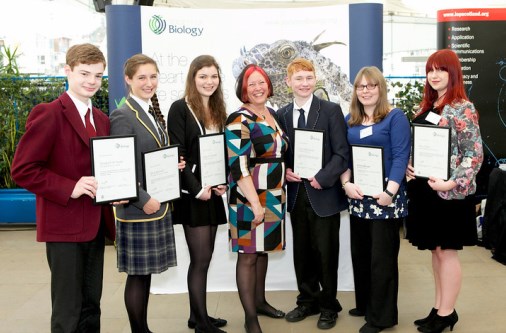
Congratulations to: Calum MacDonald, Webster's High School; Katie Campbell, St Columba's School; Alice Burnett, The High School of Dundee; Donald Taylor George Watson's College; Marc Walton, Aberdeen Grammar School; Merike Mikkov, Forth Valley College; Amy Taylor, James Gillespie's High School; Emily L Miedzybrodzka, George Heriot's School; Daniel Ross, Squair Perth College.
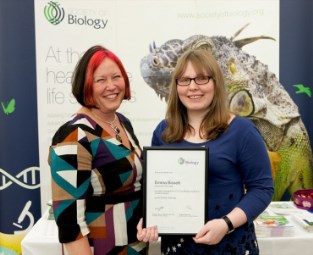 Emma Bissett (left) from the University of Dundee was presented with the Top Biology Student in Scotland 2013 award by president of the Royal Society of Chemistry Professor Lesley Yellowlees.
Emma Bissett (left) from the University of Dundee was presented with the Top Biology Student in Scotland 2013 award by president of the Royal Society of Chemistry Professor Lesley Yellowlees.
The event remains a useful forum for the Society and other learned societies in Scotland to project their relevance in a governmental context and our individual and collective availability for MSPs to consult on a wide range of issues affecting the country.



